LTC Addison Earl Baker, 36, USAAF (1907–1943)
328 BS, 93 BG (H), 8th Air Force
Ploești, Romania
August 1, 1943
Presented March 11, 1944
Posthumous
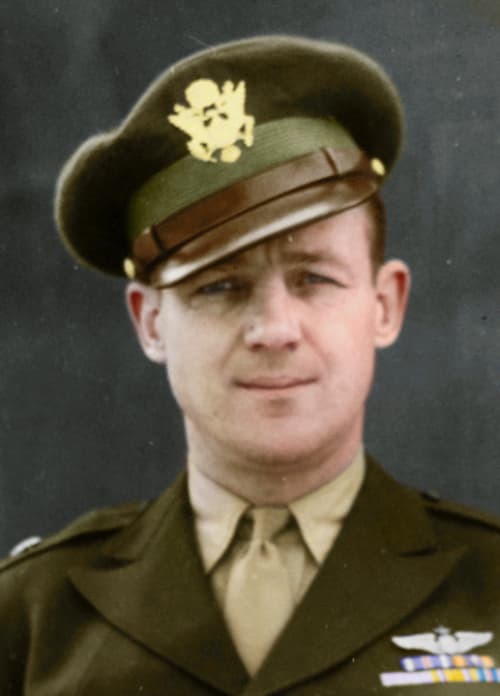
The President of the United States of America, in the name of Congress, takes pleasure in presenting the Medal of Honor (posthumously) to LTC (Air Corps) Addison Earl Baker (ASN: 0-280827), United States Army Air Forces, for conspicuous gallantry and intrepidity above and beyond the call of duty in action with the enemy on August 1, 1943. On this date he led his command, the 93rd Heavy Bombardment Group, on a daring low-level attack against enemy oil refineries and installations at Ploești, Romania.
Approaching the target, his aircraft was hit by a large-caliber anti-aircraft shell, seriously damaged, and set on fire. Ignoring the fact he was flying over terrain suitable for safe landing, he refused to jeopardize the mission by breaking up the lead formation and continued unswervingly to lead his group to the target upon which he dropped his bombs with devastating effect. Only then did he leave formation, but his valiant attempts to gain sufficient altitude for the crew to escape by parachute were unavailing and his aircraft crashed in flames after his successful efforts to avoid other planes in formation. By extraordinary flying skill, gallant leadership, and intrepidity, LTC Baker rendered outstanding, distinguished, and valorous service to our nation.
1 Like
2LT Lloyd Herbert “Pete” Hughes Jr., 22, USAAF (1921–1943)
564 BS, 389 BG, 9th Air Force
Ploești, Romania
August 1, 1943
Presented April 18, 1944
Posthumous
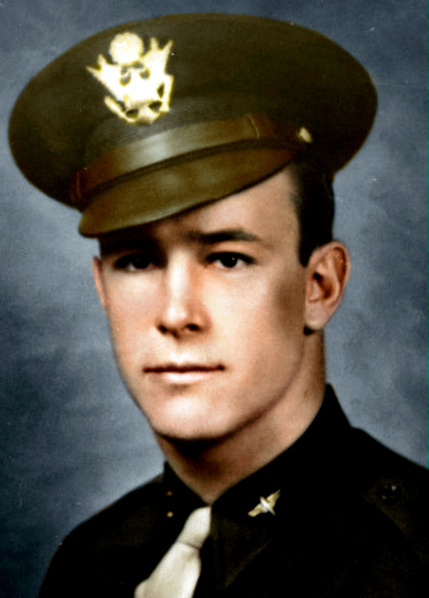
The President of the United States of America, in the name of Congress, takes pleasure in presenting the Medal of Honor (posthumously) to 2LT (Air Corps) Lloyd Herbert Hughes (ASN: 0-666292), United States Army Air Forces, for conspicuous gallantry and intrepidity above and beyond the call of duty.
On August 1, 1943, 2LT Hughes served in the capacity of pilot of a heavy bombardment aircraft participating in a long and hazardous minimum-altitude attack against the Axis oil refineries of Ploești, Romania, launched from the northern shores of Africa. Flying in the last formation to attack the target, he arrived in the target area after previous flights had thoroughly alerted the enemy defenses. Approaching the target through intense and accurate anti-aircraft fire and dense balloon barrages at dangerously low altitude, his plane received several direct hits from both large and small caliber anti-aircraft guns which seriously damaged his aircraft, causing sheets of escaping gasoline to stream from the bomb bay and from the left wing. This damage was inflicted at a time prior to reaching the target when 2LT Hughes could have made a forced landing in any of the grain fields readily available at the time. The target area was blazing with burning oil tanks and damaged refinery installations from which flames leaped high above the bombing level of the formation. With full knowledge of the consequences of entering this blazing inferno when his airplane was profusely leaking gasoline in two separate locations, 2LT Hughes, motivated only by his high conception of duty which called for the destruction of his assigned target at any cost, did not elect to make a forced landing or turn back from the attack. Instead, rather than jeopardize the formation and the success of the attack, he unhesitatingly entered the blazing area and dropped his bomb load with great precision. After successfully bombing the objective, his aircraft emerged from the conflagration with the left wing aflame. Only then did he attempt a forced landing, but because of the advanced stage of the fire enveloping his aircraft the plane crashed and was consumed. By 2LT Hughes’ heroic decision to complete his mission regardless of the consequences, in utter disregard of his own life, and by his gallant and valorous execution of this decision, he has rendered a service to our country in the defeat of our enemies which will everlastingly be outstanding in the annals of our nation’s history.
1 Like
MAJ John Louis “Jack” Jerstad, 25, USAAF (1918–1943)
HQ, 93 BG, 9th Air Force (detached 2 BW, 8th Air Force)
Ploești, Romania
August 1, 1943
Presented October 28, 1943
Posthumous
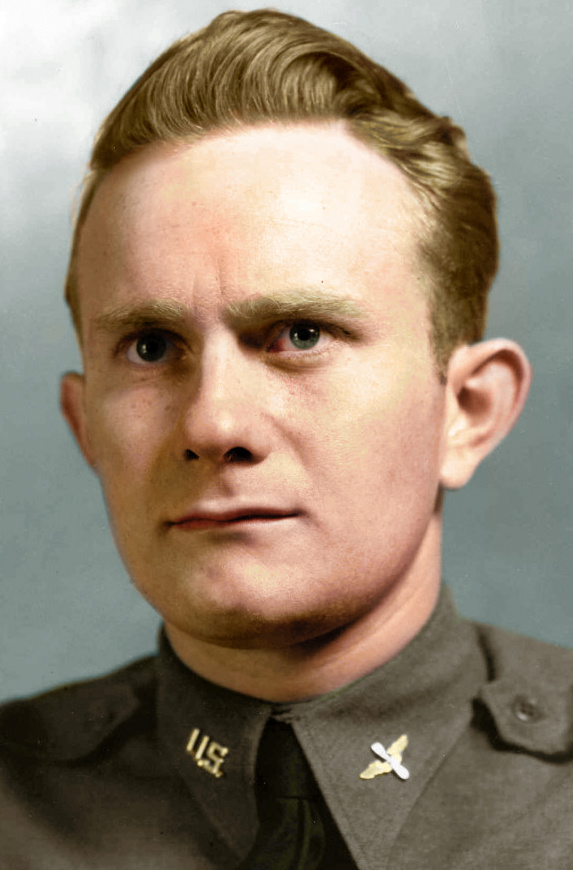
The President of the United States of America, in the name of Congress, takes pleasure in presenting the Medal of Honor (posthumously) to MAJ (Air Corps) John Louis Jerstad (ASN: 0-435784), United States Army Air Forces,for conspicuous gallantry and intrepidity above and beyond the call of duty while serving with the Headquarters, 93rd Bombardment Group (H), Ninth Air Force (detached from the Eighth Air Force) in action on August 1, 1943.
MAJ Jerstad served as pilot of the lead aircraft in his group in a daring low-level attack against enemy oil refineries and installations at Ploești, Romania. Although he had completed more than his share of missions and was no longer connected with this group, so high was his conception of duty that he volunteered to lead the formation in the correct belief that his participation would contribute materially to the success of this attack. MAJ Jerstad led the formation into attack with full realization of the extreme hazards involved and despite withering fire from heavy and light anti-aircraft guns. Three miles from the target his airplane was hit, badly damaged, and set on fire. Ignoring the fact that he was flying over a field suitable for a forced landing, he kept on the course. After the bombs of his aircraft were released on the target, the fire in his ship became so intense as to make further progress impossible and he crashed into the target area. By his voluntary acceptance of a mission, he knew was extremely hazardous and his assumption of an intrepid course of action at the risk of life over and above the call of duty, MAJ Jerstad set an example of heroism which will be an inspiration to the U.S. Armed Forces.
1 Like
COL Leon William Johnson, 38, USAAF (1904–1997)
44 BG (H), 9th Air Force (detached 2 BW, 8th Air Force)
Ploești, Romania
August 1, 1943
Presented November 22, 1943
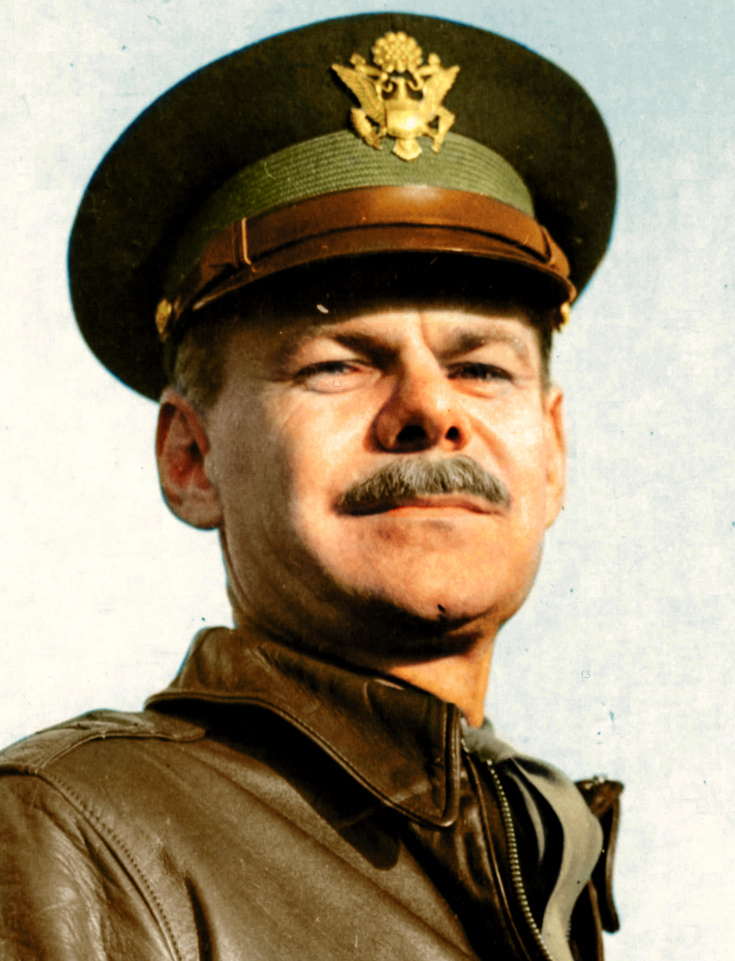
The President of the United States of America, in the name of Congress, takes pleasure in presenting the Medal of Honor to COL (Air Corps) Leon William Johnson (AFSN: 88A/0-16429), United States Army Air Forces, for conspicuous gallantry in action and intrepidity at the risk of his life above and beyond the call of duty while serving with Headquarters, 44th Bombardment Group (H), Ninth Air Force (Detached from the Eighth Air Force) in action on August 1, 1943.
COL Johnson, as commanding officer of a heavy bombardment group, led the formation of the aircraft of his organization constituting the fourth element of the mass low-level bombing attack of the 9th U.S. Air Force against the vitally important enemy target of the Ploești oil refineries. While proceeding to the target on this 2,400-mile flight, his element became separated from the leading elements of the mass formation in maintaining the formation of the unit while avoiding dangerous cumulus cloud conditions encountered over mountainous territory. Though temporarily lost, he reestablished contact with the third element and continued on the mission with this reduced force to the prearranged point of attack, where it was discovered that the target assigned to COL Johnson’s group had been attacked and damaged by a preceding element. Though having lost the element of surprise upon which the safety and success of such a daring form of mission in heavy bombardment aircraft so strongly depended, COL Johnson elected to carry out his planned low-level attack despite the thoroughly alerted defenses, the destructive anti-aircraft fire, enemy fighter planes, the imminent danger of exploding delayed-action bombs from the previous element, of oil fires and explosions, and of intense smoke obscuring the target. By his gallant courage, brilliant leadership, and superior flying skill, COL Johnson so led his formation as to destroy totally the important refining plants and installations which were the object of his mission. COL Johnson’s personal contribution to the success of this historic raid, and the conspicuous gallantry in action and intrepidity at the risk of his life above and beyond the call of duty demonstrated by him on this occasion constitute such deeds of valor and distinguished service as have during our nation’s history formed the finest traditions of our Armed Forces.
COL John Riley Kane, 36, USAAF (1907–1996)
98 BG (H), 9th Air Force
Ploești, Romania
August 1, 1943
Presented August 9, 1943
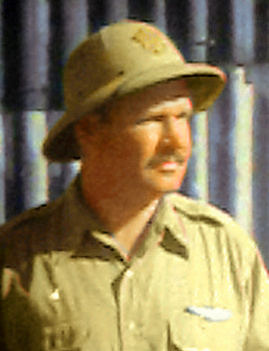
The President of the United States of America, in the name of Congress, takes pleasure in presenting the Medal of Honor to COL (Air Corps) John Riley Kane (ASN: 0-29680), United States Army Air Forces, for conspicuous gallantry in action and intrepidity at the risk of his life above and beyond the call of duty, August 1, 1943.
On this date he led the third element of heavy bombardment aircraft in a mass low-level bombing attack against the vitally important enemy target of the Ploești oil refineries. En route to the target, which necessitated a roundtrip flight of over 2,400 miles, COL Kane’s element became separated from the leading portion of the massed formation in avoiding dense and dangerous cumulus cloud conditions over mountainous terrain. Rather than turn back from such a vital mission he elected to proceed to his target. Upon arrival at the target area, it was discovered that another group had apparently missed its target and had previously attacked and damaged the target assigned to COL Kane’s element. Despite the thoroughly warned defenses, the intensive anti-aircraft fire, enemy fighter airplanes, extreme hazards on a low-level attack of exploding delayed-action bombs from the previous element, of oil fire and explosions and dense smoke over the target area, COL Kane elected to lead his formation into the attack. By his gallant courage, brilliant leadership, and superior flying skill, he and the formation under his command successfully attacked this vast refinery so essential to our enemies’ war effort. Through his conspicuous gallantry in this most hazardous action against the enemy, and by his intrepidity at the risk of his life above and beyond the call of duty, COL Kane personally contributed vitally to the success of this daring mission and thereby rendered most distinguished service in the furtherance of the defeat of our enemies.
PVT James William Reese, 23, USA (1920–1943)
Company F, 26th Infantry Regiment, 1st Infantry Division
Mt. Vassillio, Sicily, Italy
August 5, 1943
Presented December 17, 1943
Posthumous
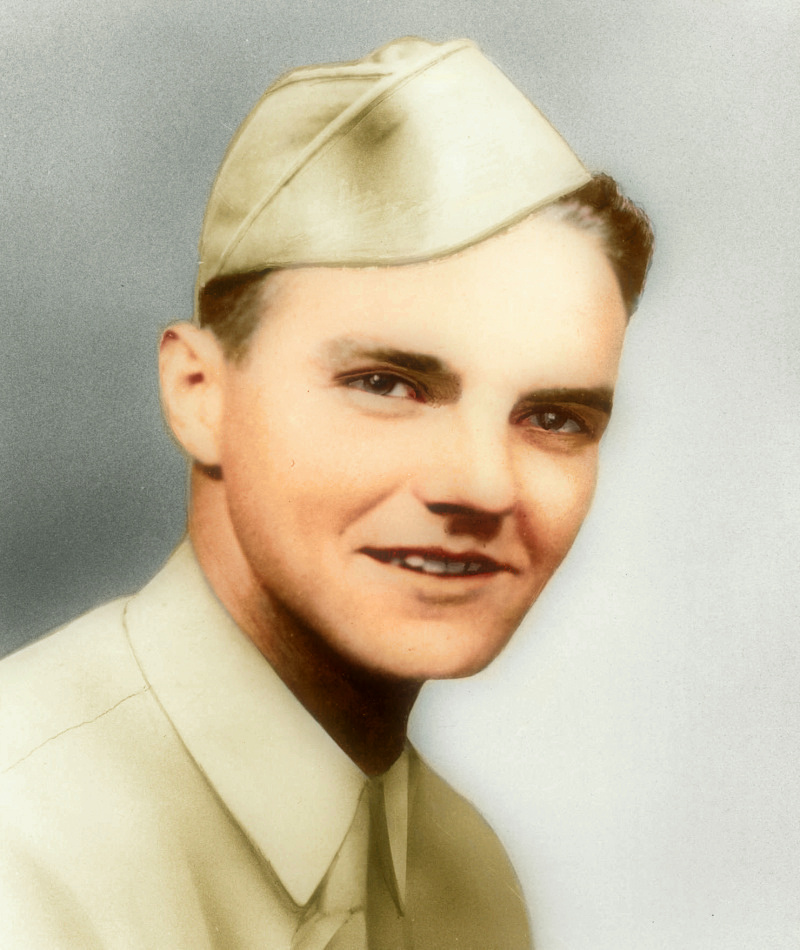
The President of the United States of America, in the name of Congress, takes pride in presenting the Medal of Honor (posthumously) to PVT James W. Reese, United States Army, for conspicuous gallantry and intrepidity at the risk of life, above and beyond the call of duty in action involving actual conflict with the enemy.
When the enemy launched a counterattack which threatened the position of his company, PVT Reese, as the acting squad leader of a 60mm mortar squad, displaying superior leadership on his own initiative, maneuvered his squad forward to a favorable position, from which, by skillfully directing the fire of his weapon, he caused many casualties in the enemy ranks, and aided materially in repulsing the counterattack. When the enemy fire became so severe as to make his position untenable, he ordered the other members of his squad to withdraw to a safer position, but declined to seek safety for himself. So as to bring more effective fire upon the enemy, PVT Reese, without assistance, moved his mortar to a new position and attacked an enemy machinegun nest. He had only 3 rounds of ammunition but secured a direct hit with his last round, completely destroying the nest and killing the occupants. Ammunition being exhausted, he abandoned the mortar, seized a rifle and continued to advance, moving into an exposed position overlooking the enemy. Despite a heavy concentration of machine-gun, mortar, and artillery fire, the heaviest experienced by his unit throughout the entire Sicilian campaign, he remained at this position and continued to inflict casualties upon the enemy until he was killed. His bravery, coupled with his gallant and unswerving determination to close with the enemy, regardless of consequences and obstacles which he faced, are a priceless inspiration to our Armed Forces.
MAJ Ralph Cheli, 24, USAAF (1919–1944)
405 BS, 38 BG (H), 5th Air Force
Over Wewak, New Guinea
August 18, 1943
Presented October 28, 1943
Posthumous
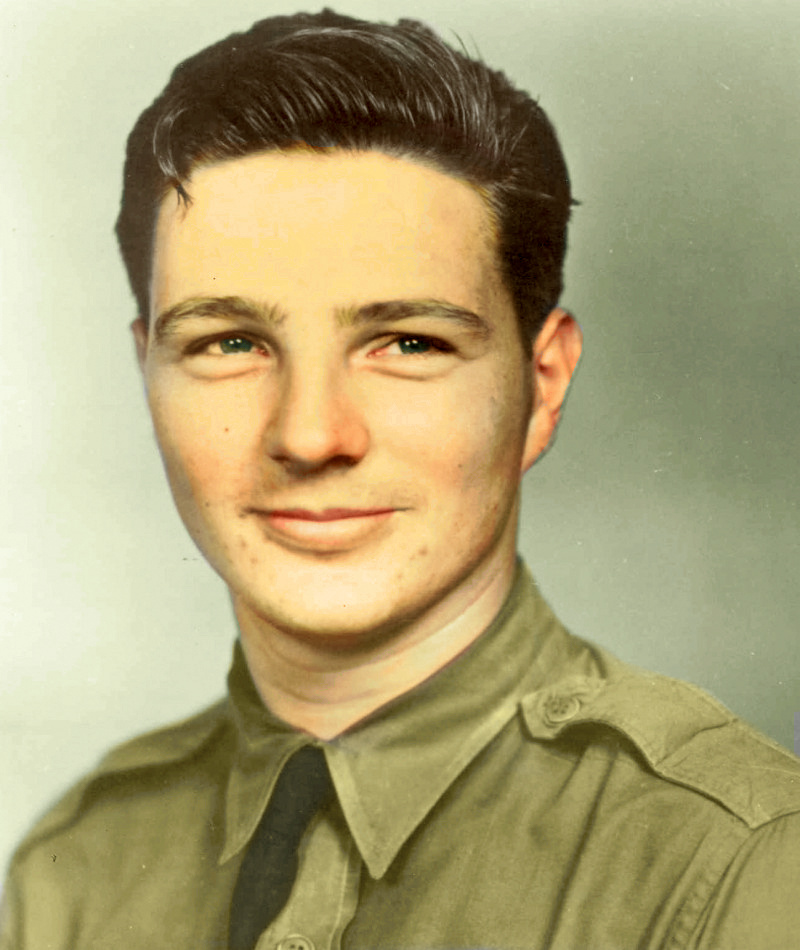
The President of the United States of America, in the name of Congress, takes pride in presenting the Medal of Honor (posthumously) to MAJ (Air Corps) Ralph Cheli (ASN: 0-399830), United States Army Air Forces, for conspicuous gallantry and intrepidity above and beyond the call of duty in action with the enemy over Wewak, New Guinea, while serving with the 405th Bombardment Squadron, 38th Bombardment Group (H), Fifth Air Force.
While MAJ Cheli was leading his squadron in a dive to attack the heavily defended Dagua Airdrome, intercepting enemy aircraft centered their fire on his plane, causing it to burst into flames while still two miles from the objective. His speed would have enabled him to gain necessary altitude to parachute to safety, but this action would have resulted in his formation becoming disorganized and exposed to the enemy. Although a crash was inevitable, he courageously elected to continue leading the attack in his blazing plane. From a minimum altitude, the squadron made a devastating bombing and strafing attack on the target. The mission completed, MAJ Cheli instructed his wingman to lead the formation and crashed into the sea.
1LT Kenneth Ambrose Walsh, 26, USMC (1916–1998)
VMF-124, 1st Marine Aircraft Wing
Solomon Islands Area
August 15 and 30, 1943
Presented February 8, 1944
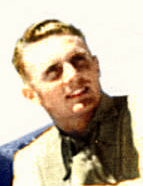
The President of the United States of America, in the name of Congress, takes pleasure in presenting the Medal of Honor to 1LT Kenneth Ambrose Walsh (MCSN: O-10449), United States Marine Corps, for extraordinary heroism and intrepidity at the risk of his life above and beyond the call of duty as a Pilot in Marine Fighting Squadron ONE HUNDRED TWENTY-FOUR (VMF-124), Marine Air Group TWELVE (MAG-12), FIRST Marine Aircraft Wing, in aerial combat against enemy Japanese forces in the Solomon Islands Area on August 15 and 30, 1943.
Determined to thwart the enemy’s attempt to bomb Allied ground forces and shipping at Vella Lavella on August 15, 1943, 1LT Walsh repeatedly dived his plane into an enemy formation outnumbering his own division six-to-one and, although his plane was hit numerous times, shot down two Japanese dive bombers and one fighter. After developing engine trouble on August 30 during a vital escort mission, 1LT Walsh landed his mechanically disabled plane at Munda, quickly replaced it with another, and proceeded to rejoin his flight over Kahili. Separated from his escort group when he encountered approximately 50 Japanese Zeros, he unhesitatingly attacked, striking with relentless fury in his lone battle against a powerful force. He destroyed four hostile fighters before cannon shellfire forced him to make a dead-stick landing off Vella Lavella where he was later picked up. His valiant leadership and his daring skill as a flier served as a source of confidence and inspiration to his fellow pilots and reflect the highest credit upon the U.S. Naval Service.
1 Like







